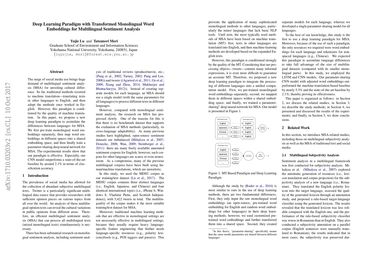Deep Learning Paradigm with Transformed Monolingual Word Embeddings for Multilingual Sentiment Analysis
The surge of social media use brings huge demand of multilingual sentiment analysis (MSA) for unveiling cultural difference. So far, traditional methods resorted to machine translation---translating texts in other languages to English, and then adopt the methods once worked in English. However, this paradigm is conditioned by the quality of machine translation. In this paper, we propose a new deep learning paradigm to assimilate the differences between languages for MSA. We first pre-train monolingual word embeddings separately, then map word embeddings in different spaces into a shared embedding space, and then finally train a parameter-sharing deep neural network for MSA. The experimental results show that our paradigm is effective. Especially, our CNN model outperforms a state-of-the-art baseline by around 2.1% in terms of classification accuracy.
PDF Abstract PACLIC 2018 PDF PACLIC 2018 Abstract




